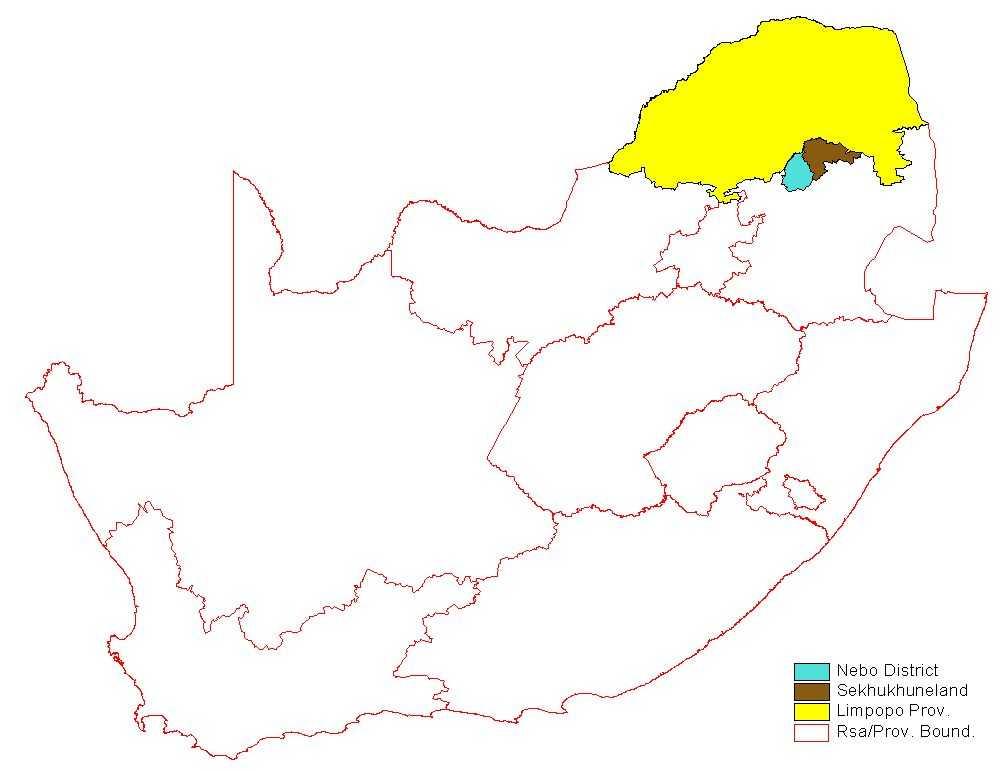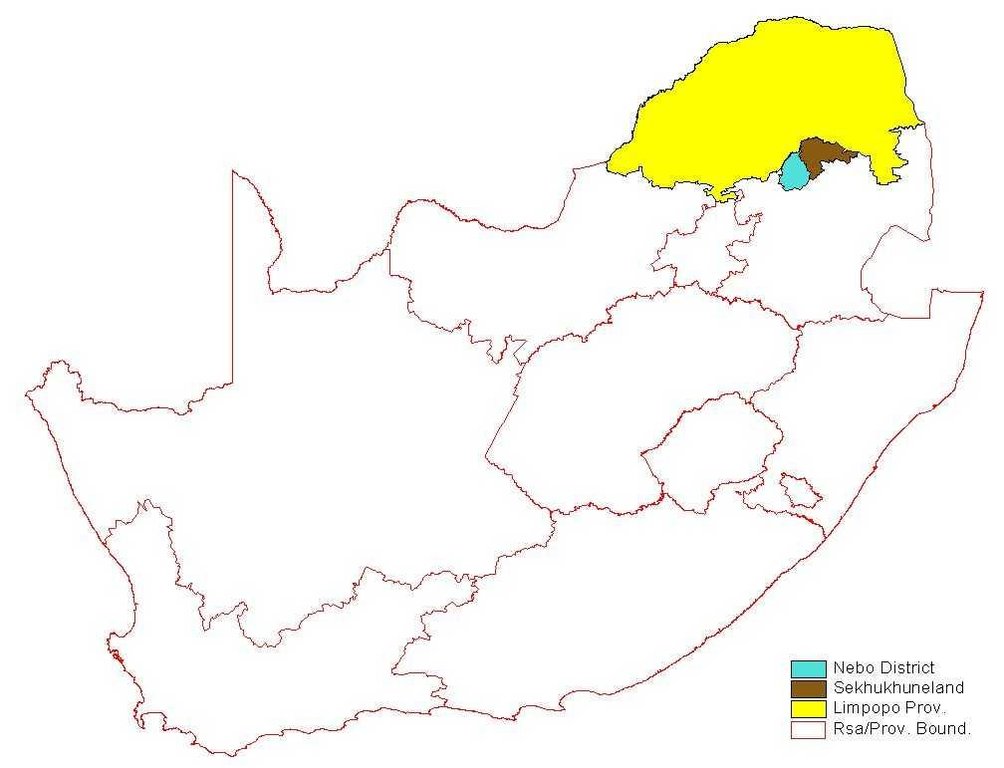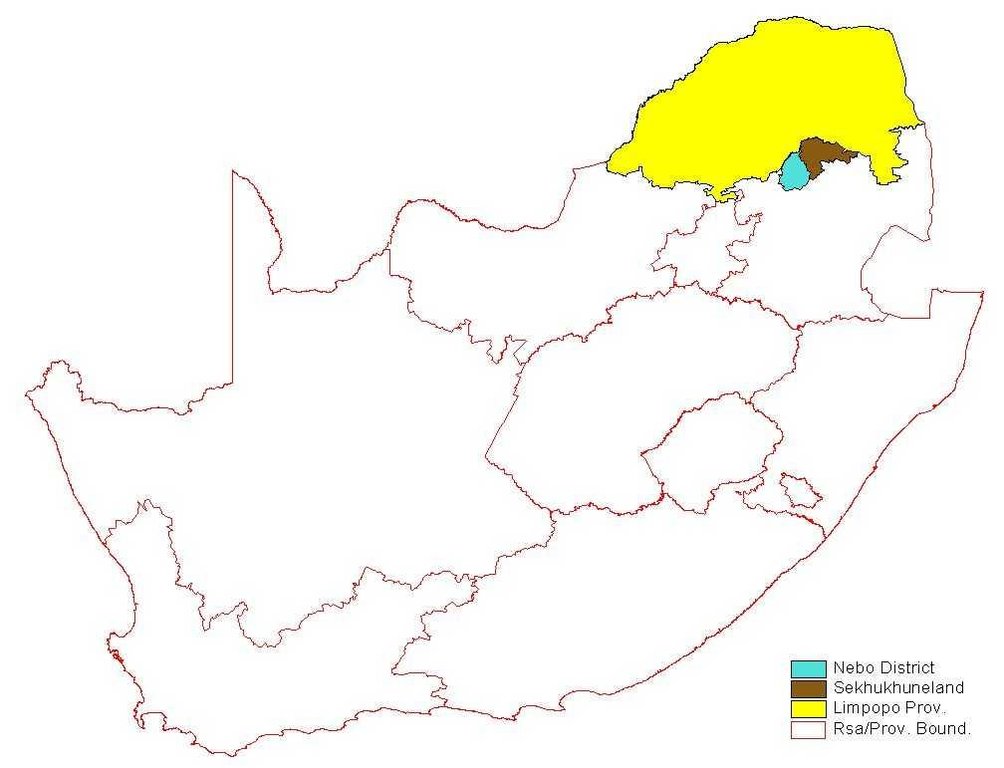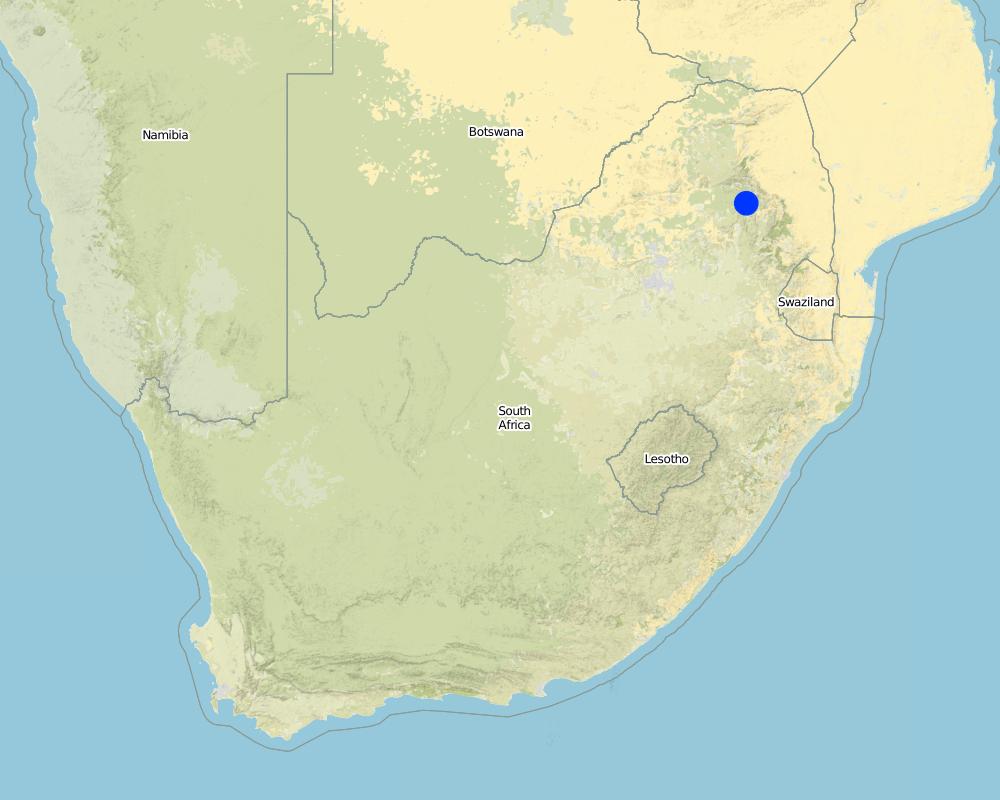Interactive community approach, biodiversity increase. [Afrique du Sud]
- Création :
- Mise à jour :
- Compilateur : Igmé Wilhelm Terblanche
- Rédacteur : –
- Examinateur : Fabian Ottiger
approaches_2415 - Afrique du Sud
Voir les sections
Développer tout Réduire tout1. Informations générales
1.2 Coordonnées des personnes-ressources et des institutions impliquées dans l'évaluation et la documentation de l'Approche
Nom du ou des institutions qui ont facilité la documentation/ l'évaluation de l'Approche (si pertinent)
Action Green Heritage (Action Green Heritage) - Afrique du Sud1.3 Conditions relatives à l'utilisation par WOCAT des données documentées
Le compilateur et la(les) personne(s) ressource(s) acceptent les conditions relatives à l'utilisation par WOCAT des données documentées:
Oui
1.4 Références au(x) questionnaire(s) sur les Technologies de GDT

Gully control (gabions) at Maandagshoek [Afrique du Sud]
Stone walls and re-vegetation (planting of indigenous trees) = Rehabilitation
- Compilateur : Igmé Wilhelm Terblanche
2. Description de l'Approche de GDT
2.1 Courte description de l'Approche
Community involvement
2.2 Description détaillée de l'Approche
Description détaillée de l'Approche:
Aims / objectives: Community involvement in SWC and environmental conservation. SWC project for erosion control, reduction of siltation, water conservation, biodiversity increase, and environmental education. An interactive method in some cases combined the approach of the Department or Action Green Heritage, who worked through the tribal chief (traditional authority), the relevant government representatives (extension), and the Transitional Local Council (TLC - Government elected body e.g. municipality). The SWC projects are still in the on-going phase, having passed the implementation stage. The Nature reserves are also on going (the development phase has been finalised). The SWC programmes of NGO and government extension officer, environmental education officer and community are interlinked with the NGO for funding, the Government provides technical background and the TLC ensures broad involvement.
2.3 Photos de l'approche
2.5 Pays/ région/ lieux où l'Approche a été appliquée
Pays:
Afrique du Sud
Région/ Etat/ Province:
Northern Province
Map
×2.6 Dates de début et de fin de l'Approche
Indiquez l'année de démarrage:
1984
2.7 Type d'Approche
- fondé sur un projet/ programme
2.8 Principaux objectifs de l'Approche
The Approach focused mainly on SLM with other activities (Nearby school involved environmental education for the school children, community, leaders (chiefs) and politicians involved)
Raising awareness, reduce silt soil loss. Nature reserve: financial gain for the community, protection of natural resources & increase biodiversity, awareness raising. Erosion projects: reduce siltation and soil loss and raising awareness. Natural Resource: Financial gain, protection of Natural Resources, an increase in biodiversity and raising awareness. To get community involvement in environmental issues
The SLM Approach addressed the following problems: Awareness, silt up of dams and rivers, land degradation (erosion) In nature reserves: land degradation, poverty, awareness, not sensitive enough for environmental problems. Erosion project: land degradation, siltation of dams/rivers. Nature Reserves: land degradation, poverty, awareness (lack of environmental knowledge)
2.9 Conditions favorisant ou entravant la mise en œuvre de la(des) Technologie(s) appliquée(s) sous l'Approche
normes et valeurs sociales/ culturelles/ religieuses
- entrave
High population density - shortage of land - not always so easy to get land for building up nature reserve
Treatment through the SLM Approach: Awareness & project economic sustainable (that community can financially benefit)
disponibilité/ accès aux ressources et services financiers
- entrave
Not enough funding
Treatment through the SLM Approach: Keep on looking for funding & generate a bigger awareness of the problem & what could be done, also outside of government like Olifant river forum (some people are there involved with a lot of funding behind them)
cadre juridique (régime foncier, droits d'utilisation des terres et de l'eau)
- favorise
The existing land ownership, land use rights / water rights moderately helped the approach implementation: communal land if supported from tribal chief hinder: moderate: communal land if no ownership, a lot of people
autre
- entrave
Develop a project across a tribal border
Treatment through the SLM Approach: Environmental education
3. Participation et rôles des parties prenantes impliquées dans l'Approche
3.1 Parties prenantes impliquées dans l'Approche et rôles
- exploitants locaux des terres / communautés locales
Action Green Heritage. People living in the area
In tribal meetings mainly men, for work mainly women. Chief will not take any decision before the community agreed
- ONG
- gouvernement local
Provincial government
- gouvernement national (planificateurs, décideurs)
3.2 Participation des exploitants locaux des terres/ communautés locales aux différentes phases de l'Approche
| Participation des exploitants locaux des terres/ communautés locales | Spécifiez qui était impliqué et décrivez les activités | |
|---|---|---|
| initiation/ motivation | passive | public meetings; Rapid/participatory rural appraisal is used today |
| planification | passive | rapid/participatory rural appraisal, public meetings |
| mise en œuvre | aucun | |
| suivi/ évaluation | passive | public meetings, reporting; |
| Research | aucun |
3.4 Prises de décision pour la sélection de la Technologie/ des Technologies
Indiquez qui a décidé de la sélection de la Technologie/ des Technologies à mettre en œuvre:
- principalement les spécialistes de la GDT, après consultation des exploitants des terres
Expliquez:
consultative.
Decisions on the method of implementing the SLM Technology were made by mainly by SLM specialists with consultation of land users. consultative.
4. Soutien technique, renforcement des capacités et gestion des connaissances
4.1 Renforcement des capacités/ formation
Une formation a-t-elle été dispensée aux exploitants des terres/ autres parties prenantes?
Oui
Formats de la formation:
- sur le tas
Thèmes abordés:
On the site for work, fencing, gabions, planting of trees
4.2 Service de conseils
Les exploitants des terres ont-ils accès à un service de conseils?
Oui
Décrivez/ commentez:
Name of method used for advisory service: LEP; Key elements: NGO was responsible for education for the people of Lebowa; 1) Advisory service was carried out through: non-governmental agency. Extension staff: Government & NGO 2) Target groups for extension: land users, politicians/decision makers; Activitie
Advisory service is quite adequate to ensure the continuation of land conservation activities; They have the staff
4.3 Renforcement des institutions (développement organisationnel)
Des institutions ont elles été mises en place ou renforcées par le biais de l'Approche?
- oui, beaucoup
Spécifiez à quel(s) niveau(x), ces institutions ont été renforcées ou mises en place:
- local
Précisez le type de soutien:
- financier
- renforcement des capacités/ formation
- équipement
4.4 Suivi et évaluation
Le suivi et l'évaluation font ils partie de l'Approche? :
Oui
Commentaires:
bio-physical aspects were ad hoc monitored through measurements
technical aspects were ad hoc monitored through observations
socio-cultural aspects were ad hoc monitored through observations
economic / production aspects were ad hoc monitored through measurements
area treated aspects were ad hoc monitored through measurements;
no. of land users involved aspects were ad hoc monitored through observations
management of Approach aspects were ad hoc monitored through observations
There were few changes in the Approach as a result of monitoring and evaluation: Involvement of the community in the project from the beginning to a great extent. Reduction of animal numbers.
5. Financement et soutien matériel externe
5.1 Budget annuel de la composante GDT de l'Approche
Si le budget annuel précis n'est pas connu, indiquez une fourchette:
- 100 000-1 000 000
Commentez (par ex. principales sources de financement/ principaux bailleurs de fonds):
Approach costs were met by the following donors: government (national - Nature reserve): 80.0%; international non-government (-): 20.0%
5.2 Soutiens financiers/ matériels fournis aux exploitants des terres
Les exploitants des terres ont-ils reçu un soutien financier/ matériel pour la mise en œuvre de la Technologie/ des Technologies?
Oui
5.3 Subventions pour des intrants spécifiques (incluant la main d'œuvre)
- équipement
| Spécifiez les intrants subventionnés | Dans quelle mesure | Spécifiez les subventions |
|---|---|---|
| machines | entièrement financé | |
| outils | entièrement financé | |
Si la main d'œuvre fournie par les exploitants des terres était un intrant substantiel, elle était:
- payée en espèces
5.4 Crédits
Des crédits ont-ils été alloués à travers l'Approche pour les activités de GDT?
Non
6. Analyses d'impact et conclusions
6.1 Impacts de l'Approche
Est-ce que l'Approche a aidé les exploitants des terres à mettre en œuvre et entretenir les Technologies de GDT?
- Non
- Oui, un peu
- Oui, modérément
- Oui, beaucoup
N/A
Did other land users / projects adopt the Approach?
- Non
- Oui, un peu
- Oui, modérément
- Oui, beaucoup
Personnel, some was transferred to other Departments and localities
6.3 Durabilité des activités de l'Approche
Les exploitants des terres peuvent-ils poursuivre ce qui a été mis en œuvre par le biais de l'Approche (sans soutien extérieur)?
- incertain
Si non ou incertain, spécifiez et commentez:
In practice maybe because of the need of financial support for staff and management of game Soil conservation - without leading it is not possible
6.4 Points forts/ avantages de l'Approche
| Points forts/ avantages/ possibilités du point de vue de l'exploitant des terres |
|---|
| financial |
| job opportunities |
| are part of the management |
| Points forts/ avantages/ possibilités du point de vue du compilateur ou d'une autre personne ressource clé |
|---|
| involvement of community |
| ownership of the land |
| little damage & high potential |
| get financial benefits - uplifting living-standard |
| sustainable jobs, protection |
| if transferred to community - can be financed from outside e.g. Development bank, this is only possible if fully transferred to the community |
6.5 Faiblesses/ inconvénients de l'Approche et moyens de les surmonter
| Faiblesses/ inconvénients/ risques du point de vue de l’exploitant des terres | Comment peuvent-ils être surmontés? |
|---|---|
| would like to have more influence in the management |
| Faiblesses/ inconvénients/ risques du point de vue du compilateur ou d'une autre personne ressource clé | Comment peuvent-ils être surmontés? |
|---|---|
| Smaller reserves are overstaffed and poor management - transfer to the community and then employ a manager from outside (may be a solution). | |
| Nature reserves are still regarded as government nature reserves (financial and run). Only if community is to some extent involved in the management, people take ownership. |
7. Références et liens
7.1 Méthodes/ sources d'information
- visites de terrain, enquêtes sur le terrain
- interviews/entretiens avec les exploitants des terres
Liens et modules
Développer tout Réduire toutLiens

Gully control (gabions) at Maandagshoek [Afrique du Sud]
Stone walls and re-vegetation (planting of indigenous trees) = Rehabilitation
- Compilateur : Igmé Wilhelm Terblanche
Modules
Aucun module trouvé





